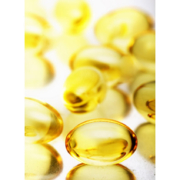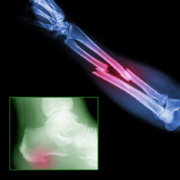Dr. Chet’s Health Memos
 If it’s in the health news today, I’ll be writing about it as soon as I read the research, both old and new. With my email Health Memos, you’ll know more about making lifestyle choices that will help you get and keep good health. These free, concise updates on health are emailed to subscribers twice a week. Subscribe today and get a free MP3, in English or Spanish, of Dr. Chet’s Top Ten Tips—Small Changes for a Healthier Life.
If it’s in the health news today, I’ll be writing about it as soon as I read the research, both old and new. With my email Health Memos, you’ll know more about making lifestyle choices that will help you get and keep good health. These free, concise updates on health are emailed to subscribers twice a week. Subscribe today and get a free MP3, in English or Spanish, of Dr. Chet’s Top Ten Tips—Small Changes for a Healthier Life.
The Teal Pumpkin Project
Halloween is Monday, and I happened to check out a local news story about The Teal Pumpkin Project. It began in eastern Tennessee and has been adopted nationally by the Food Allergy and Education (FARE) group. In a nutshell, the Teal Pumpkin Project does just that: tries to keep kids with allergies to nuts, eggs, and other food allergens safe by providing non-food treats to kids.
Paula and I have done this in the past before we even heard of the Teal Pumpkin (primarily to limit our own exposure to candy, because those Snickers aren’t going to last . . .
We're sorry, but this content is available to Members and Insiders only.
If you're already a DrChet.com Member or Insider, click on the Membership Login link on the top menu. Members may upgrade to Insider by going to the Store and clicking Membership; your membership fee will be prorated automatically.
Last Was First
What was the roar I told you about in the last message? It was for the last runner of the Grand Rapids Kids Marathon. You can see him in the group picture: the kid on the far right with the walker in the cool shades. I don’t know exactly what his condition is; most likely a muscular disorder of some sort. But that didn’t stop him from participating.
His mom accompanied him the whole way. When he came through the aid station, he wanted a cup . . .
We're sorry, but this content is available to Members and Insiders only.
If you're already a DrChet.com Member or Insider, click on the Membership Login link on the top menu. Members may upgrade to Insider by going to the Store and clicking Membership; your membership fee will be prorated automatically.
Kids Marathon
One of the requirements of a triathlon training group I belong to is to volunteer at a running or other event. This past weekend, the Grand Rapids Marathon held a Kids Marathon. I was in—not just to help, but experience what this type of event is like.
The idea is this: kids run or walk at least one mile, three times a week, with a friend or family member and track their progress on a training sheet that goes through mile 25. On race weekend, the children run or walk the last 1.2 miles of the marathon distance . . .
We're sorry, but this content is available to Members and Insiders only.
If you're already a DrChet.com Member or Insider, click on the Membership Login link on the top menu. Members may upgrade to Insider by going to the Store and clicking Membership; your membership fee will be prorated automatically.
Why You Need to Supplement
The author of the opinion article in JAMA recommended that physicians make their patients aware of the research that questions the effectiveness of supplementation, hence his title “Negligible Benefits, Robust Consumption” (1). In making that recommendation, he gives the precise reason why that’s a bad idea. As I said Thursday, the answer can be found in the data used in the original article in JAMA about supplementation use in the U.S. (2).
While the JAMA article focused on supplementation, it also included data on food . . .
We're sorry, but this content is available to Members and Insiders only.
If you're already a DrChet.com Member or Insider, click on the Membership Login link on the top menu. Members may upgrade to Insider by going to the Store and clicking Membership; your membership fee will be prorated automatically.
Supplements: No Benefits?
The opinion piece in the journal article was titled “The Supplement Paradox: Negligible Benefits, Robust Consumption” (1). The author is a well-respected physician who has written often about what he feels are the problems in the dietary supplement industry. He used the article I talked about Tuesday as a basis for his latest thoughts. Why would supplement use stay the same when research demonstrates that there are little to no benefits?
He raised three points. First, he suggests that people haven’t heard about the negative studies. I would debate that based on the questions I get about science . . .
We're sorry, but this content is available to Members and Insiders only.
If you're already a DrChet.com Member or Insider, click on the Membership Login link on the top menu. Members may upgrade to Insider by going to the Store and clicking Membership; your membership fee will be prorated automatically.
Changes in Supplement Use
I take dietary supplements, and so do most of the people I know. We’re not alone. Using data from the NHANES data in 1999 and 2012, researchers compared how many people used supplements and what type of supplements they used (1).
Close to 38,000 subjects were included in the study. The percentage of people using supplements remained fairly stable over the time span at 52%; what changed was the types of supplements people took. Multivitamin-multimineral (MVMM) dropped 6% from 37% to 31%. There were some increases: vitamin D supplementation (other than from MVMM) increased from 5.1 . . .
We're sorry, but this content is available to Members and Insiders only.
If you're already a DrChet.com Member or Insider, click on the Membership Login link on the top menu. Members may upgrade to Insider by going to the Store and clicking Membership; your membership fee will be prorated automatically.
How Long Can Third-Hand Smoke Last?
Researchers were interested in finding out how long the residual particulates and substances last in people who quit smoking and in their environment. They recruited 90 smokers to participate in the study and tested the verified quitters for third-hand smoke pollutants at baseline, one week, and one, three, and six months after they quit.
The subjects were tested in two ways: their fingers and their urine were checked for metabolites of third-hand smoke. They also tested the dust in their environment. As you might expect, the bodies of the ex-smokers saw a dramatic decline in smoking metabolites . . .
We're sorry, but this content is available to Members and Insiders only.
If you're already a DrChet.com Member or Insider, click on the Membership Login link on the top menu. Members may upgrade to Insider by going to the Store and clicking Membership; your membership fee will be prorated automatically.
The Tenacity of Third-Hand Smoke
Recently I found a moving box full of my mother’s recipes. When I opened the box, I was hit with the smell of stale, old, cigarette smoke. My mother was a smoker for over 45 years, so the smell makes sense. What you should also know is that she died over 20 years ago. That’s how long the smells can linger from the residual parts of cigarette smoke.
Cleaning her home after she died, I had to use a full strength cleaner without diluting it in water, then rinse. One pail of water would last for a section . . .
We're sorry, but this content is available to Members and Insiders only.
If you're already a DrChet.com Member or Insider, click on the Membership Login link on the top menu. Members may upgrade to Insider by going to the Store and clicking Membership; your membership fee will be prorated automatically.
Broken Bones and Heel Spurs
Two questions I regularly get asked about bones: What can I do to help heal broken bones? And what can I do about heel spurs? Without question, you must see a doctor to get a diagnosis. This is something you shouldn’t self-diagnose or try to “handle” it yourself. Once you’ve done that, here’s what I would do.
For broken bones, once the bones are set and you have a cast or other immobilizing device, there are some nutrients that may help:
- Glucosamine: 1,500 – 3,000 mg per day. Seem odd? Not . . .
We're sorry, but this content is available to Members and Insiders only.
If you're already a DrChet.com Member or Insider, click on the Membership Login link on the top menu. Members may upgrade to Insider by going to the Store and clicking Membership; your membership fee will be prorated automatically.
Baby Bones
If you read the message regularly, you know I frequently mention my pretend grandson Riley. He’s 18 months old and he has one speed: fast. As a result, he occasionally falls. While sometimes he does fall hard enough to hurt himself, he doesn’t break any bones as I might if I fell that often. Why not?
Most of a baby’s bones begin as cartilage. A baby has about 300 bones at birth. As they grow, their bones begin to get solid; the cartilage cells gradually become bone cells by absorbing minerals such as calcium. Some bones fuse . . .
We're sorry, but this content is available to Members and Insiders only.
If you're already a DrChet.com Member or Insider, click on the Membership Login link on the top menu. Members may upgrade to Insider by going to the Store and clicking Membership; your membership fee will be prorated automatically.










